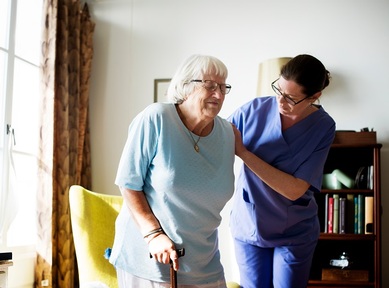Three quarters of care workers in England earn below 'real living wage'
With almost three-quarters of care workers in England being paid below the real living wage bracket, leaders want the government to “value the contribution of essential workers" and ensure care work is "rewarded" with a real living wage.

According to an analysis by Skills for Care for the Living Wage Foundation 2019/20, 73 per cent (604,168) of frontline staff currently working in the social care sector are earning below the current threshold in England.
The analysis also shows care workers in London are the highest proportion in England to be paid below the living wage.
In 20 of the 32 boroughs in the capital, the analysis found nine out of ten workers were receiving payment below the London living wage of £10.85 per hour.
This was followed by the north-east of England with 82 per cent and the north-west at 78 per cent. The south-east had the lowest proportion of 54 per cent of care workers paid below the real living wage.
The government announced last week that the real living wage in the UK had risen by 20p to £9.50 per hour, and by 10p to £10.85 an hour in London.
Laura Gardiner, director of the Living Wage Foundation, said: "We have clapped these workers and are proud of them, but that fact is not something Britain can be proud of.
“It’s time to rethink how government, public bodies and businesses work together to value the contribution of essential workers. A first step must be ensuring adequate funding so that all care work is rewarded with, at least, a real living wage.
“They’ve put their lives on the line caring for others during this pandemic, so it’s essential we ensure they earn enough to look after their own families.
"The real living wage is the only UK wage rate based on what it costs to live. It ensures workers and their families can meet every day needs – things like a surprise dentist trip and a new school uniform for growing kids."
’It’s a moral outrage social care workers do not earn real Living Wage’
The real living wage is calculated based on public consultation about necessities and analysis of the cost of living. It differs from the statutory national living wage which is currently £8.72 per hour for people aged 25 and over.
Analysis by the Fawcett Society shows eight-in-ten care workers are women. Care workers are also very likely to be parents or carers themselves and three times more likely to be single parents than the workforce as a whole.
Professor Martin Green, chief executive of Care England said: “The care workforce is the sector’s greatest resource and if the pandemic has taught us one thing it is the worth of each and every care worker.
“It is essential that there are career pathways in place and staff are treated on an equal footing as colleagues in the NHS. The way in which social care is funded makes it impossible for care providers to pay what our valued staff are truly worth.”
According to new polling by Survation for Citizens UK, it reveals 82 per cent of the public would now back government investment in social care to fund a pay rise for care workers.
Labour has renewed its calls for the government to fix the funding in social care, and publish a plan to ensure that all staff are paid the real living wage.
Deputy leader Angela Rayner said: "Ministers fell over themselves to pose for the cameras and clap our carers earlier this year, but applause doesn’t pay the bills and warm words don’t put food on the table.
“It is a moral outrage that three-quarters of social care workers do not even earn the real Living Wage. This situation was wrong before this pandemic, but now it is absolutely unconscionable.”
Latest News
 29-Jul-24
Dementia Bus gives carehome.co.uk staff insight into life with dementia
29-Jul-24
Dementia Bus gives carehome.co.uk staff insight into life with dementia
 27-Jul-23
UK's top home care agencies in 2023 revealed
27-Jul-23
UK's top home care agencies in 2023 revealed
 30-Nov-22
A quarter of older people keep their falls secret from family
30-Nov-22
A quarter of older people keep their falls secret from family
 29-Nov-22
'Covid-19 has not gone away' say terminally ill
29-Nov-22
'Covid-19 has not gone away' say terminally ill
 28-Nov-22
IT consultant who received poor care opens 'compassionate' home care business
28-Nov-22
IT consultant who received poor care opens 'compassionate' home care business